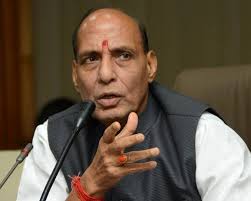KATHMANDU, June 3: Indian Defense Minister Rajnath Singh on Tuesday said that the border issue between Nepal and India will be resolved through the talks.
In an interview to Indian TV channel Network18, the Indian Defense Minister said he would not allow bitterness to enter into India-Nepal ties. “Nepal is a brother nation. There can be differences with a brother. I will not allow bitterness enter into India-Nepal ties,” he said.
Responding to a query on the latest row between Nepal and India on the issue of Kalapani, Lipu Lekh and Limpiyadhura, Singh said the issue will be resolved through dialogue. “We will sit down with Nepal and will definitely solve this border issue,” he said.
Singh’s remarks comes in the wake of growing diplomatic tension between the two countries after India released a new political map in November last year incorporating Nepali territories Kalapani, Lipu Lekh and Limpiyadhura within Indian borders. Nepal also expressed strong objection after Indian Defense Minister Singh inaugurated a link road that passes through Lipu Lekh last month, asking the Indian side not to carry out any activities inside Nepali territories.
A cabinet meeting on June 18 endorsed a new political map of Nepal that includes Kalapani, Lipu Lekh and Limpiyadhura on the Nepali side of the border as per the relevant treaties and historical evidence. A constitutional amendment bill to update the political map of Nepal in the national emblem has also been tabled in parliament last week.
The Sugauli Treaty reached between Nepal and the then East-India Company in 1816 has determined the River Kali as the western boundary of Nepal with India. Nepal has consistently maintained that Kalapani, Lipu Lekh and Limpiyadhura that lie east of the River Kali are indisputably Nepali territories and that they were made to look like disputed ones after the Indian army occupied the areas since 1962.
As such, Nepal had also objected to the agreement reached between India and China to expand a trade route through the Lipu Lekh Pass without Nepal’s consent during Indian Prime Minister Narendra Modi’s visit to Beijing in May, 2015.
Republic’s report


